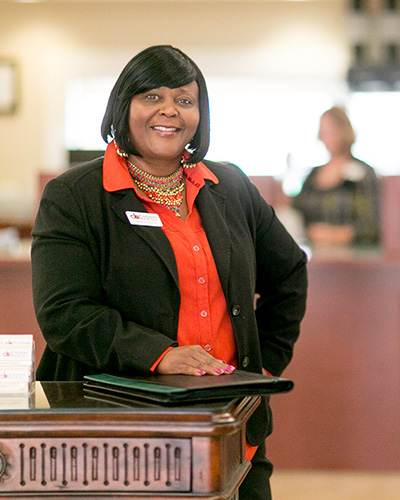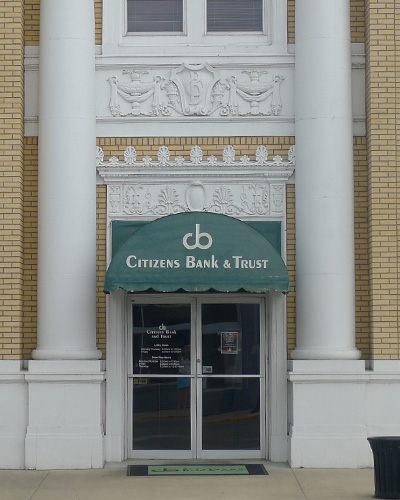
Compliance & Security
Important Information
For information, visit any of our local Citizens Bank & Trust offices or call 863-676-7631.
For existing customer account information, call our Anytime Bank Line at 863-679-7777 or 877-851-8597.
To report a lost or stolen debit card, call 1-800-383-8000.
Phishing Alert
Unless you initiated contact with Citizens Bank & Trust, we will not contact you to ask for personal information. Do not provide your social security number or bank account information, or complete online forms connected with unsolicited e-mails that appear to come from the bank. When in doubt, you may contact us as noted in the LOCATIONS & HOURS section of our website.
Notice To Commercial Customers
In accordance with the requirements of the Unlawful Internet Gambling Enforcement Act of 2006 and Regulation GG, this notice is to inform you that restricted transactions are prohibited from being processed through your account or relationship with our institution. Restricted transactions are transactions in which a person accepts credit, funds, instruments or other proceeds from another person in connection with unlawful Internet Gambling.
For more information, call or visit your local Citizens Bank & Trust office.
At Citizens Bank & Trust, we are concerned about our Customer’s financial and physical wellbeing, so we want to share some important information with you about a growing crime ……. Elder Financial Abuse.
What Is Elder Financial Abuse?
Elder financial abuse is a crime estimated to cost victims nearly $36.5 billion a year and deprives elderly adults of their resources and ultimately their independence. Anyone who sees signs of theft, fraud, misuse of a person’s assets or credit, or use of undue influence to gain control of the elderly person’s money or property, should alert family, or the proper authorities.
Helpful Tips for Seniors
What should you do to protect yourself?
- Get to know your banker and build a relationship. They can look out for suspicious activities related to your account.
- Plan ahead. Consult a financial advisor, attorney and trustworthy person before signing any document you do not understand and to act as your agent in estate-planning matters, to protect your assets and ensure your wishes are followed.
- Never rush into a financial decision. Feel free to say “No”. Ask for details in writing and get a second opinion. After all, it’s your money.
- Shred receipts, bank statements and unused credit card offers before throwing them away.
- Safeguard your checkbook, account statements and other sensitive information when others will be in your home.
- If you aren’t already a Citizens Bank & Trust - Senior Secure Checking Account Customer, which has a 24/7 ID Protect benefit, order copies of your credit report once a year to ensure its accuracy and identify potential fraud.
- Never give personal information, including Social Security Number, account number or other financial information to anyone over the phone, unless you initiated the call and the other party is trusted.
- Never pay a fee or taxes to collect sweepstakes or lottery “winnings.”
- Check references and credentials before hiring anyone. Pay with checks and credit cards instead of cash, to keep a paper trail.
- You have the right not to be threatened or intimidated. If you think someone close to you is trying to take control of your finances, call your local Adult Protective Services or tell someone at your bank.
- Trust your instincts and think it over before you act. Exploiters and abusers are often very skilled and can be charming and forceful in their effort to convince you to give up control of your finances. Don’t be fooled—if something doesn’t feel right, it may not be right. If it sounds too good to be true, it probably is. Don’t allow a Scammer to draw you in with romance, a call threatening you into paying a bill or taxes, someone informing you that you’re a Winner but must pay a fee, or asking you to help royalty move money out of their country. These are just a few of the more popular scams.
Tips for Family and Friends
What are the warning signs of elder financial abuse?
The key to spotting financial abuse may be a change in a person’s financial patterns. Watch out for these “red flags”:
- Unusual activity in the elderly person’s bank accounts, including large, frequent, or unexplained withdrawals or transfers the customer cannot explain, attempts to wire large sums of money, or sudden non-sufficient fund activities.
- ATM withdrawals by the elderly person who has never used a debit or ATM card.
- Changing from a basic account to one that offers more complicated services, which they may not fully understand or need.
- New “best friends” accompanying the elderly person to the bank.
- Uncharacteristic activities, such as closing CDs or accounts without regard to penalties, or unpaid bills.
- Suspicious signatures on checks, or outright forgery.
- Confusion, fear or lack of awareness on the part of the elderly customer. Refusal to make eye contact, shame or reluctance to talk about the problem.
- Bank statements that no longer go to the customer’s home.
- New powers of attorney, altered wills and trusts, or checks written as “loans” or “gifts,” any of which the elderly person does not understand or remember doing.
- A caretaker, relative or friend who suddenly begins conducting financial transactions on behalf of the elderly person without proper documentation.
What should you do if you suspect financial abuse of an elderly person?
- Report the elder financial abuse to their bank and/or local police—if fraud is involved, they should investigate.
- Talk to their friends or loved ones to try to determine what is happening with their financial situation, such as a new person “helping” them with money management, or a relative using cards or credit without their permission.
- Contact Adult Protective Services for help.
https://reportabuse.dcf.state.fl.us/ or Call 800-962-2873 – Press #1
Other Resources:
Polk County Health Department - Division of Elderly Services: 863-534-5320
National Center on Elder Abuse (NCEA): https://ncea.acl.gov/
CFPB Office of Financial Protection for Older Americans:
https://www.consumerfinance.gov/consumer-tools/educator-tools/resources-for-older-adults/
Savvy Savings Seniors: Steps to Avoiding Scams:
UNEMPLOYMENT INSURANCE FRAUD ALERT
This is a Fraud Alert from the Office of Inspector General at the U.S. Department of Labor
Fraudsters are perpetrating numerous schemes related to the COVID-19 pandemic. In one scheme, scammers have offered to help individuals file claims for unemployment benefits. The scammers then ask for personal information including social security numbers and dates of birth. The scammers may ask you to provide payment, or your credit card information, in assisting you in filing or qualifying for your unemployment benefits. You do not need to pay anyone to file or qualify for your benefits.
Unsolicited calls, social media platforms, and door-to-door visits are several ways that individuals have been targeted.
Be aware that your personal information may be used fraudulently without your permission.
Victims of these scams face potential harm. The personal information the scammers collect may be used to commit identity theft to file fraudulent unemployment insurance claims.
If you would like to report an allegation of fraud involving unemployment insurance or other U.S. Department of Labor activities or programs, please contact the OIG Hotline at: https://www.oig.dol.gov/hotline.htm or 202-693-6999 or 1-800-347-3756.
Easy Access
Our Mobile Banking Services provide 24/7 access to your Citizens Bank & Trust accounts through your tablet or smartphone. This gives you the ability to conveniently pay your bills, check your balances, make transfers, deposit checks and much more while on the go.







